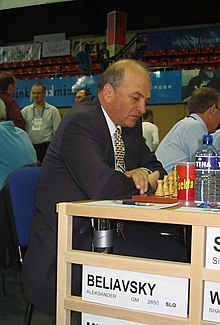Alexander Beliavsky
| Alexander Beliavsky | |
|---|---|
 Beliavsky at the 35th chess olympiad, Bled 2002 | |
| Full name | Alexander Genrikhovich Beliavsky |
| Country | |
| Title | Grandmaster (1975) |
| FIDE rating | 2645 (No. 91 on the May 2010 FIDE ratings list) |
| Peak rating | 2710 (July 1997) |
Alexander Genrikhovich Beliavsky (sometimes transliterated as Belyavsky, born December 17, 1953) is a Ukrainian chess grandmaster.
Beliavsky was born in Lviv. He currently lives in Slovenia and he plays for the Olympic team there. He is noted for his uncompromising style of play and for his classical opening repertoire, including openings such as the Queen's Gambit, Ruy Lopez and French Defence, for example.
Beliavsky won the World Junior Chess Championship in 1973 and the USSR Chess Championship four times in 1974, 1980, 1987 and 1990.
In the World Chess Championship cycle, Beliavsky qualified for the Candidates Tournament once, losing to eventual winner Garry Kasparov in the quarterfinals of the 1983 Candidates matches.
In tournaments, he was first equal at Baden 1980, first at Tilburg 1981, second equal at Tilburg 1984, joint winner at Wijk aan Zee 1984 and joint second at the same venue a year later. At the second Russia (USSR) vs Rest of the World match in 1984, he was top scorer for the victorious Soviet team, defeating Yasser Seirawan 2-0 and Bent Larsen 1½-½. Beliavsky is a four times winner of the Vidmar Memorial: in 1999, 2001, 2003 (with Emil Sutovsky) and 2005.[1]
Beliavsky is also a first-class endgame study composer, having published about fifty studies, many together with Leopold Mitrofanov. He won six first prizes in composition tourneys.
He is also a chess coach and in 2004 was awarded the title of FIDE Senior Trainer.[2]
As of November 2009, he is the oldest person among the world's top 100 active players.[3]
Books
- Beliavsky, Alexander; Mikhalchishin, Adrian (1995), Winning Endgame Technique, Batsford, ISBN 0-7134-7512-9
- Beliavsky, Alexander; Mikhalchishin, Adrian (2000), Winning Endgame Strategy, Batsford, ISBN 0-7134-8446-2
- Beliavsky, Alexander; Mikhalchishin, Adrian (2003), Modern Endgame Practice, Batsford, ISBN 0-7134-8740-2
References
- ^ "Dr. Milan Vidmar Memorial Tournaments". sah-zveza.si. Retrieved 6 April 2010.
- ^ Global Chess Academy - FIDE Certified Trainers
- ^ http://ratings.fide.com/toplist.phtml
External links
- Alexander Beliavsky rating card at FIDE
- Alexander Beliavsky player profile and games at Chessgames.com
